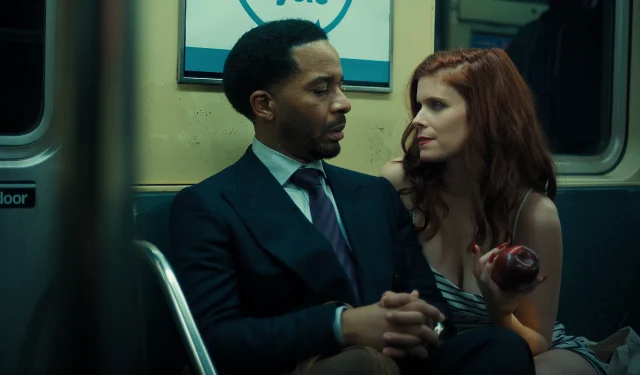Reimagining a Classic: Andre Gaines’ The Dutchman
In a contemporary reimagining of Amiri Baraka’s seminal play, The Dutchman, director Andre Gaines elevates the narrative into the present-day, shifting the intense dynamics between the characters. The interaction between Clay (portrayed by André Holland) and Lula (Kate Mara) now takes center stage outside the strict confines of a train car, allowing the themes of race and identity to resonate with a modern audience, albeit at the cost of some of the original’s raw intensity.
Historical Context of Dutchman
When the original Dutchman premiered at the Cherry Lane Theater in 1964, its unfiltered exploration of racial tensions sent shockwaves through the audience. Critics were taken aback, with one describing the Off-Broadway production—later an Obie Award winner—as “an explosion of hatred.” The play’s visceral critique illuminated the urgent need for societal change and sparked introspection regarding white and Black relations at a pivotal moment in American history.
Baraka’s Artistic Revolution
This 30-minute work debuted at a time when Baraka was redefining his role in literature and society, moving from the integrationist ideology of prior civil rights advocates to the assertive demands of the Black Power Movement. Baraka’s subsequent embrace of black pride and angry dissatisfaction with passive representations of racial violence marked a profound shift in his artistry. During this era, he was grappling with personal upheavals, including his divorce from Hettie Jones, the themes of which echo throughout the play. Notably, Dutchman was one of the final pieces published under Baraka’s birth name, LeRoi Jones.
Cinematic Adaptation and Baraka’s Legacy
The 1967 film adaptation by Anthony Harvey, which was recently revitalized by the Museum of Modern Art, effectively captured Baraka’s unrestrained narrative. Premiering at the Venice Film Festival, it showcased Shirley Knight’s electrifying performance as Lula, aligning with Baraka’s underlying rage and bitter nihilism. In this adaptation, Clay, played by Al Freeman Jr., is depicted as a naive individual falling victim to Lula’s bewitching allure, leading to his inevitable downfall. In contrast, Gaines’ portrayal of Clay in his adaptation offers a more mature perspective, transforming him into a thoughtful individual striving to preserve his marriage and foster a hopeful future for Harlem.
Complex Character Dynamics in The Dutchman
In Gaines’ version, Clay is introduced during a trying couples therapy session with his wife, Kaya (Zazie Beetz), and their discerning therapist, Dr. Amiri (Stephen McKinley Henderson). The session is fraught with tension as Kaya encourages Clay to be more vulnerable and share his struggles. Clay, still reeling from past infidelity and enveloped in a profound sense of alienation, finds it difficult to comply. His internal conflict reflects W.E.B. Du Bois’s concept of double consciousness, which makes him feel misunderstood and reluctant to open up.
Meta-Narrative and Character Evolution
Gaines, aware of the legacy of Baraka’s work, weaves a meta-narrative that juxtaposes the original’s raw emotion with a new sense of earnestness. While the essence of Baraka’s original themes is preserved, the clarity of these sentiments sometimes becomes muddied. The film employs various cinematic techniques, including mirror imagery and unconventional camera angles (by DP Frank G. DeMarco), alongside a gripping score by Daniel Hart, to evoke a pervasive sense of dread, straddling the line between an engaging introduction to Baraka’s work and a more challenging narrative.
Encounter and Escalation
The pivotal meeting between Clay and Lula occurs on a train bound for uptown, where Clay is rehearsing a speech for a fundraiser aimed at garnering support from the Harlem elite. Mara’s portrayal of Lula brings an unpredictable energy that contrasts Holland’s increasingly wary Clay, who questions her blatant disregard for personal boundaries. Lula’s determination is unwavering, setting the stage for intense verbal exchanges grounded in Baraka’s powerful dialogue.
Tension and Transformation
As the narrative unfolds, Gaines skillfully adapts moments to reflect personal creative insights. The film’s strongest scenes arise from the tension during the fundraiser as Lula manipulates the social dynamics, exacerbating Clay’s internal struggles. Here, Gaines successfully captures the intricacies of dual identity and racial tension, allowing for more organic interpretations of the text.
A Muddled Yet Engaging Adaptation
While some interpretative choices enrich Gaines’ adaptation, others risk diluting the original’s striking potency. Conversations that explicitly outline tensions can detract from the viewer’s engagement, leading to moments that feel excessively literal. In its current form, The Dutchman offers an entertaining, although uneven, exploration of Baraka’s legacy, caught between the weighty impact of its source material and the director’s fresh curiosities.


